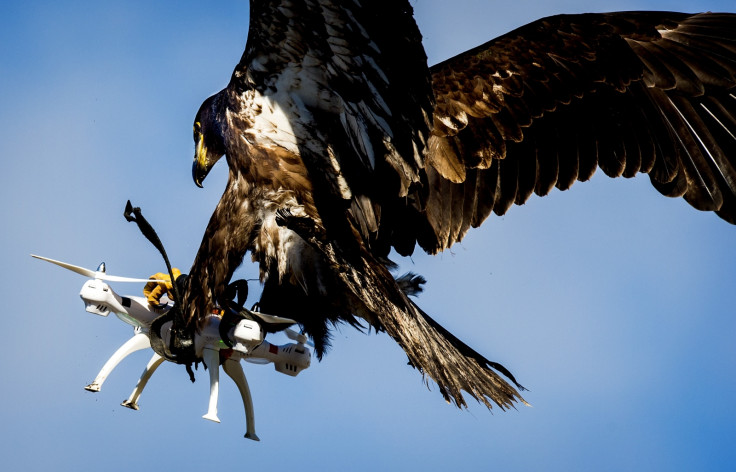Drones v eagles: UK could use birds to stop criminals flying contraband into prisons
The UK government could train eagles to prevent drones from delivering drugs and other contraband to prisons.

The UK Prisons Minister says that trained eagles may need to be used in order to stop criminals from using drones to smuggle contraband into prisons.
During Justice Questions in the House of Commons on 1 November, Prisons Minister Sam Gyimah said that using drones to smuggle illicit goods into prisons is a completely "new problem" facing the prison service, according to the BBC.
Conservative backbencher Sir Desmond Swayne asked how the practice of using unmanned aerial vehicles (UAV) to fly over prison grounds and drop packages from the air can be stopped, and Gyimah responded that he is currently "keeping a close eye on what's happening in Holland, where they're using eagles to stop drones".
In September, Dutch police became the first in the world to announce that they were now deploying eagles to attack drones that fly anywhere where they might pose a threat to the public, such as close to sensitive restricted areas, or near airports.
Although animal rights groups raised concerns about using eagles for this purpose, the police say that trials conducted since January have shown that the birds are not in any danger. About 100 officers are now being trained to work with the eagles, and the 'Guard from Above' UAV prevention unit will be put into action in summer 2017.
Concerns that drones will be used to attack key people and places
According to the Times, after hearing about the new anti-drone measures being implemented by Dutch police, London's Metropolitan Police sent a chief inspector to the Netherlands to learn more about how the eagle system works.
There are rising concerns that terrorists could easily arm UAVs and use them to attack high profile locations and targets at speed, such as Number 10 Downing Street, the PM's car, or a major event attended by dignitaries and royalty.
Because the drone is travelling so quickly and is quite small, it is difficult to detect them and even harder to stop them in time, which is what happened when a drunk man crashed a drone into the grounds of the White House in May 2015.
The US military is so concerned that there is a possibility of drones being armed with semi-automatic weapons or used as flying bombs that they have actually carried out field tests whereby they armed $5,000 (£3,227.47) worth of UAVs against a convoy of armoured tanks, and scarily the drones won.
And the danger is real – in mid-October, a drone laden with explosives was remotely piloted by terrorists linked to Islamic state (Isis/Daesh) in Iraq. The UAV exploded, killing two Kurdish fighters and seriously injuring two soldiers with the French Special Forces.
© Copyright IBTimes 2025. All rights reserved.






















